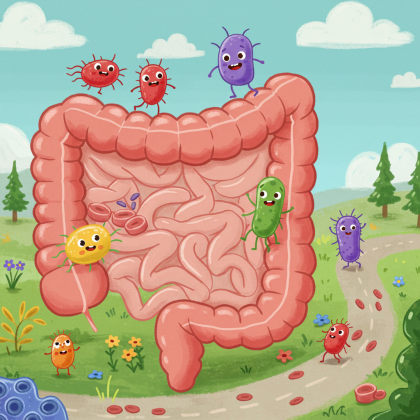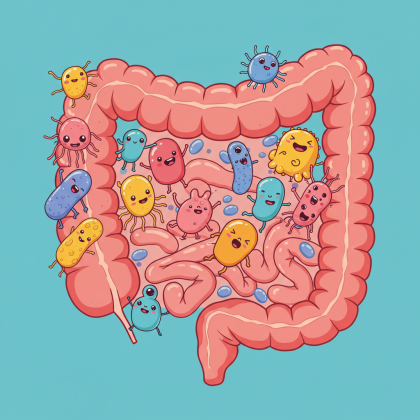Gut Health Is About More Than Digestion
When most people think about their digestive system, they think about food, absorption, and maybe the occasional stomachache. But in recent years, science has uncovered something extraordinary — your gut is far more powerful than previously imagined.
At the heart of your gut’s power is the microbiome: trillions of bacteria, viruses, and fungi that live in your digestive tract. These microscopic organisms play a crucial role in not just digestion, but also immune health, mental health, weight control, inflammation, and even your risk of chronic disease.
If you care about your overall well-being, understanding your gut might be one of the most important health moves you ever make.
More on this and other wellness topics:
https://healthmanual.net/healthtips/
1. What Is the Gut Microbiome?
The gut microbiome refers to the community of microorganisms — mostly bacteria — that live in your intestines. Every human carries around 3 to 5 pounds of these microbes, and the unique makeup of your microbiome is influenced by:
- Diet
- Genetics
- Antibiotic use
- Environment
- Lifestyle and stress
These microbes interact constantly with your body. A balanced microbiome supports health. An imbalanced one — called dysbiosis — is linked to many diseases.

2. How Gut Health Affects the Entire Body
Immune System
Nearly 70% of your immune system resides in your gut. A healthy microbiome helps train immune cells to respond appropriately to threats — and avoid overreacting (as seen in autoimmune diseases).
Mental Health
There is a gut-brain axis, a direct communication pathway between the digestive tract and the brain. The microbiome helps produce neurotransmitters like serotonin and dopamine.
- An imbalanced gut may contribute to anxiety, depression, and brain fog
- Some studies show improvement in mood with the use of probiotics or diet changes
Weight and Metabolism
Some bacteria are better at extracting energy from food than others. People with a certain microbiome makeup are more prone to weight gain.
- Gut diversity is associated with better weight management
- Chronic inflammation from dysbiosis may impair insulin sensitivity
Inflammation and Chronic Disease
Poor gut health is linked to inflammation, which plays a role in:
- Type 2 diabetes
- Heart disease
- Obesity
- IBS (Irritable Bowel Syndrome)
- Skin conditions like eczema and acne
3. Signs Your Gut May Be Out of Balance
- Bloating or gas after meals
- Frequent constipation or diarrhea
- Food intolerances
- Sugar cravings
- Fatigue
- Mood swings or poor focus
- Frequent illness
These signs may suggest that your gut flora is imbalanced and could benefit from support.
4. How to Improve Gut Health Naturally
Eat More Fiber
Fiber is the primary food source for beneficial bacteria. Good sources include:
- Vegetables (broccoli, spinach, artichokes)
- Fruits (apples, bananas, berries)
- Legumes (beans, lentils)
- Whole grains (oats, quinoa, brown rice)
Aim for 25–30 grams of fiber per day for optimal gut support.
Include Fermented Foods
Fermented foods contain natural probiotics that support microbial diversity:
- Yogurt (with live cultures)
- Kimchi
- Sauerkraut
- Kefir
- Miso
- Tempeh
Try to eat a small serving of fermented foods daily.
Avoid Excess Sugar and Processed Foods
A diet high in sugar and refined carbs feeds harmful bacteria and yeasts in the gut.
- Limit sugary drinks, candies, and white bread
- Avoid artificial sweeteners like sucralose or aspartame, which may disrupt the microbiome
Stay Hydrated
Water supports digestion and helps nutrients reach your gut microbiota effectively.
- Drink at least 8 cups (2 liters) of water daily
- Herbal teas can also be soothing for the digestive tract
Manage Stress
Stress affects gut motility, digestion, and microbial balance.
- Practice deep breathing, meditation, or regular movement
- Try to avoid eating when extremely stressed

5. Should You Take Probiotics or Prebiotics?
Probiotics are live beneficial bacteria, often taken as supplements or in foods like yogurt and kimchi.
Prebiotics are the fibers that feed these bacteria, found in foods like garlic, onions, leeks, and oats.
Tips for using them effectively:
- Start slow: Too much at once can cause gas or bloating
- Use multi-strain supplements: They offer a broader range of benefits
- Cycle your sources: Rotate between different probiotic foods
Note: Not everyone needs supplements. If your diet is rich in whole plant foods and fermented products, you may get what you need naturally.
6. Leaky Gut: Real or Hype?
Leaky gut, or increased intestinal permeability, is a condition where the gut lining becomes damaged, allowing particles to “leak” into the bloodstream.
- This can trigger immune responses, food sensitivities, and inflammation
- It’s still a controversial diagnosis in mainstream medicine, but research is growing
- Supporting gut barrier health through nutrition and lifestyle may help
Strategies include removing processed foods, adding glutamine-rich foods (like bone broth), and managing stress.
7. Long-Term Gut Health = Long-Term Health
Your gut microbiome is dynamic — it can change within days depending on your diet and environment. The more diverse and balanced your microbiome, the stronger your resilience to disease, stress, and aging.
- Start small: Add one serving of fermented food daily
- Focus on variety: Rotate fruits, vegetables, and fiber sources
- Be consistent: Gut health is not a one-time fix — it’s a lifelong habit
The gut truly is your second brain — and taking care of it pays dividends throughout your life.
Conclusion: Take Charge of Your Gut Health Today
Gut health isn’t just about avoiding indigestion. It’s a central part of your immune system, brain health, hormone regulation, and chronic disease prevention. By feeding your microbiome well and creating a gut-friendly lifestyle, you’re setting the foundation for a healthier, more energized you.
Want more science-backed tips to support your health?
Visit the Health Tips section at:
https://healthmanual.net/healthtips/

Hi, I’m Hibiki — the writer behind HealthManual.net.
I cover health insurance news, wellness tips, and insightful analysis of pharmaceutical and healthcare stocks. My goal is to simplify complex topics and make health and finance information more accessible to everyone.
Thanks for reading — I hope you find the content helpful and reliable.











